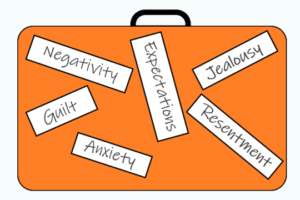Comments from Kathryn, the author of this blog and a licensed clinical social worker: You many have heard of the term “concierge medicine” or “boutique medicine”. It is a personalized medical model where patients pay a monthly or annual retainer for their medical care. Benefits traditionally include more direct access to your provider who can personalize your care. Drawbacks include the service being self-pay for the patient and you will still need health insurance to pay for routine testing and hospital stays.
As a licensed clinical social worker, I have moved to a concierge therapy model as well. My reasons for this change primarily involved discretion and confidentiality for my clients. Sadly, employer-based insurance has way too much control over your behavioral health services.
As an experienced licensed clinical social worker (LCSW) and an author of the Personal Empowerment Series of self-help books, I am passionate about clients receiving behavioral health care services in a supportive, encouraging environment. If someone is exploring therapy it is probably due to:
- a specific issue, for example, a death in the family
- during a time of ongoing high conflict, for example, going through a divorce
- when life feels overwhelming, for example, when financially, physically and/or emotionally stretched beyond their limit
Not everyone is surrounded by a great emotional support system of family, friends and co-workers. And fewer still have a tool bag full of skills to manage the good, the bad and the ugly that life will inevitably throw at you.
In choosing a concierge model for my private practice, I have moved away from a medical or disease model of therapy. I firmly believe that feeling anxious or depressed about a crisis in your life doesn’t require a diagnosis. This is one reason people are turning to coaching as opposed to therapy.
Concierge therapy is:
- discrete and highly confidential
- personalized to you and your needs
- flexible to fit your schedule and life
- flexible with the time of day, length of appointment, etc.
Discretion and Confidentiality
Since starting my career as a clinical social worker, health insurance companies and big pharma have become bigger, stronger and more intrusive in the therapeutic relationship. I have increasingly felt uncomfortable pathologizing normal life situations to suit the medical model diagnosis requirements of insurance companies. This is why I have decided to follow a concierge therapy format that focuses on confidentiality.
If you are not directly involved in the mental health field, you may not be aware how much your insurance company is involved in your mental health therapy. These are some things you may not know:
- You are only able to have therapy paid for by your insurance company if you obtain a prior-authorization. You will need to explain to a random stranger what is going on in your life and why you want therapy. The insurance company can deny you treatment.
- If your insurance company approves you to receive therapy, they will provide you with a list of therapists who are considered “in network”. Do not be fooled into thinking these are the providers who have been vetted for excellence, though they may be very good!! No, they are providers who have agreed to accept whatever financial reimbursement the insurance company is paying in your particular geographic area.
- If you are approved to receive therapy, most insurance companies have an arbitrary annual or lifetime limit on the number of therapy sessions they will pay for. For example, if your spouse has passed away and you are depressed, insurance will pay for 12 sessions. If you want to continue therapy you will have to go back through the prior authorization process to explain to a stranger why your depression is lingering beyond 12 weeks.
- For your therapist to be reimbursed by your insurance company, your therapist will be required to assign you a psychiatric diagnosis. If you do not have a diagnosis, one must be created for you to obtain payment. Are you feeling sad because your candidate lost, and you just want to talk with someone about it? For your therapist to be paid, you will be given a diagnosis, probably anxiety or depression.
- Legally, your employee-offered insurance company can request and review all of your therapy records, any time they desire, without your knowledge or permission.
After careful and thoughtful consideration for clients’ confidentiality, I have moved away from participating in a medical model therapy practice. Let me explain why it should matter to you:
- If you are going through a contentious, protracted divorce, of course you are going to feel anxious (about money), depressed (at the ending of a relationship), angry (your spouse had an affair), have mood swings (you have good days and bad days) and may even temporarily turn to alcohol or drugs (to numb your feelings). You do not have a mental illness or a disease, you have a life crisis!
- A medical model diagnosis becomes part of your permanent medical record and will follow you for the rest of your life. Modifying or erasing this diagnosis is virtually impossible.
- Certain diagnoses can be devastating, for example, a depression diagnosis for an air traffic controller could be career ending. In a child custody case, a substance use diagnosis may be used to imply you are an “unstable” or “unfit” parent.
Personalization of Services
Concierge therapy will be individualized and custom-fit for you. No two sessions will ever be identical. Because your care is personalized and not controlled by your insurance company, your sessions will be anything you need them to be:
- skill building, coping strategies, or psychoeducation
- an objective perspective
- collaborative problem solving
- a cheerleading session that includes validation and/or emotional support
- active listening in a no judgement zone
Flexible
Concierge therapy can fit your schedule and life situation. All of the following will be negotiated:
- the time of day for therapy, for example, early morning or late afternoon
- the length of your session, for example, 30, 60 or 90 minutes
- the total number of sessions you need for your particular situation
- the frequency of your sessions, for example, bi-weekly, weekly, etc.
- the mode of your therapy, for example, via video or phone
Direct Access
Concierge therapy is based on direct access to your therapist. I can only speak specifically about my concierge therapy practice, but fairly consistently across the field, when you call, email or text, your message will only be seen or heard by me, not an insurance company agent, a receptionist, answering service personnel, or anyone else who doesn’t know you or your needs.
Take Away Point
Behavioral healthcare offered by a concierge model is relatively new. When it comes to behavioral health therapy, if you have concerns about confidentiality and/or want more direct access to your provider, you may want to explore a concierge therapy model.
If you live in Maine or Texas and are interested in a concierge model of therapy, please contact me at www.kathrynmaietta.com
With warmest regards,
Thank you so much for reading this blog. If you enjoyed the content, please check out other blogs at:
https://relationshipsrelearned.com/my-blog/
https://rvingnomads.com/blog/
In addition to blogs and articles, I have written a series of self-help books. To view these books, please go to my Amazon Authors Page or go to the Self-Help Books tab at the top of this page.
To be notified of future posts, please enter your email address and click on the Subscribe button.
If you live in the State of Maine or Texas and seeking individual therapy, please go to my Concierge Therapy website: www.kathynmaietta.com
| AI has not been used to create any content for my website, articles, blogs or books. All material is original unless otherwise noted. All photos and graphics within my website and blogs were taken or created by David Harrington or Kathryn Maietta. |












